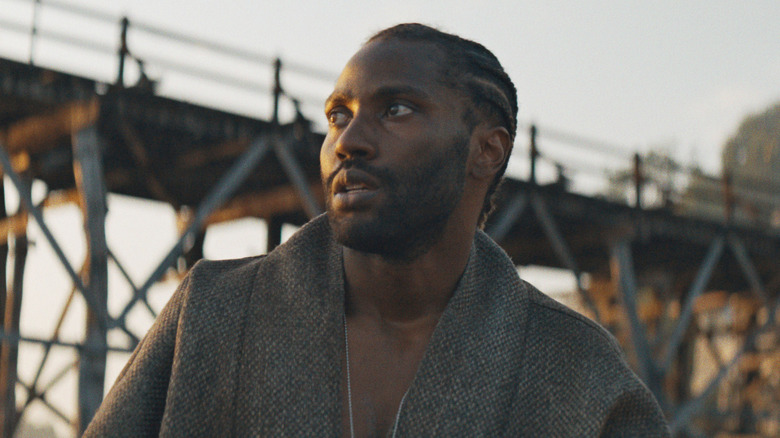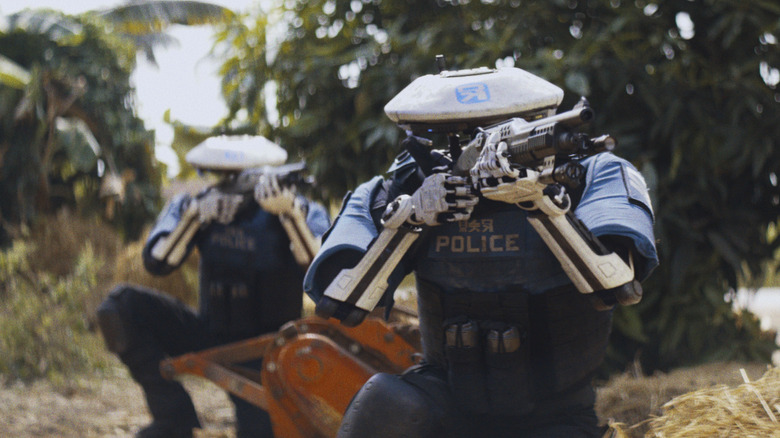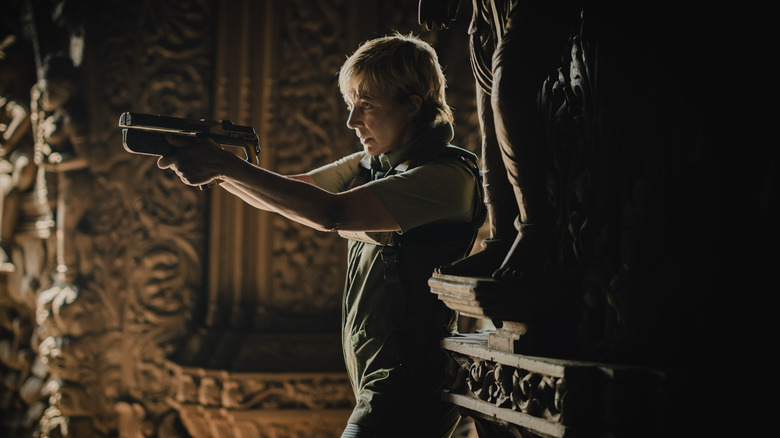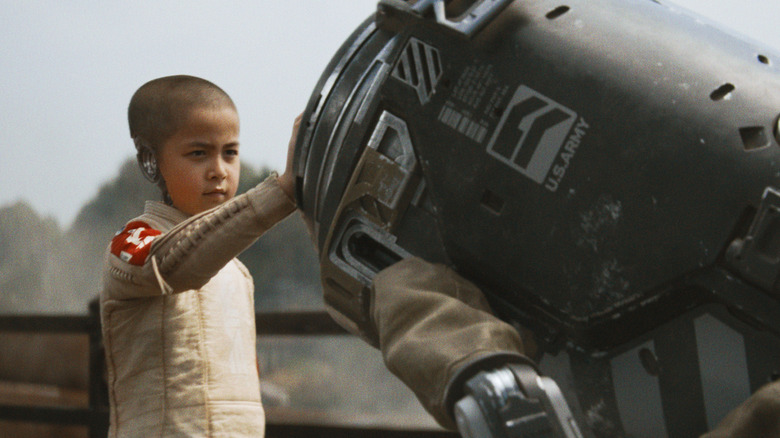The Creator's Gareth Edwards Debates AI, Evil And The Robo-Apocalypse - Exclusive Interview
In director-writer Gareth Edwards' new sci-fi epic "The Creator," set in 2065, artificial intelligence (AI) has been banned in the West after causing a devastating catastrophe in a major American city. Meanwhile, AI has continued to evolve in the East, with sentient, human-like AIs becoming accepted as equals in Asian societies. This sets off an ongoing war between the United States and much of Asia, and it's in the middle of this conflict when "The Creator" opens.
Joshua (John David Washington) is an American undercover agent who apparently loses his wife Maya (Gemma Chan) in a raid on an AI encampment. Five years later, Joshua is recruited for a mission by Colonel Jean Howell (Allison Janney), who claims that a mysterious "creator" has developed a new AI weapon which could bring the West to its knees. She wants Joshua to find it, with the added incentive that Maya may be still alive. Once back in Asia, however, Joshua discovers that the "weapon" is an AI in the shape of a little girl named Alphie (Madeleine Yuna Voyles).
To visualize an Earth just 40 years from now, Edwards — whose previous films include his low-budget 2010 debut "Monsters," 2014's "Godzilla" reboot, and 2016's "Rogue One: A Star Wars Story" — flipped the usual production process, shooting with a small crew at actual locations instead of filming on LED stages and using green screens, then building out the visual effects from there for a more seamless vision of a very plausible future.
The result is a rarity in these franchise-driven times: an original science fiction spectacle with something to say about the world we live in right now. "I was looking for a way to make a film where you get all the positives of an independent small movie with all the positives of a giant blockbuster," Edwards tells Looper in our exclusive interview. "That's what I was trying hard to pull off."
Why The Creator couldn't be more timely
It takes a few years to make a movie, and this movie's coming out now just as there's all this concern and even panic about AI. What is your take on where AI is leading us, and how does that come out in the film?
I started writing this script in 2018, and AI was a distant dream like flying cars and the moon. It was used as a device, as people who are different to us, like "the other," and exploring that idea a little bit. In terms of where AI is going, the problem ... you [read this interview] in a year or even six months, you're going to look an idiot for trying to predict AI. It's been so crazy, the acceleration of how quickly it's all been going. It's shocked everybody, even the people working on it.
My hope is that if you look at every major technological breakthrough like electricity, computers, the internet, they had massive ... there were seismic shifts in nearly every industry. We got to the other side of it and everyone, once the dust settled, would agree that life's better having that technology around. We wouldn't go back.
AI is going to do that. There's going to be a lot of problems, a lot of things to figure out, but on the other side of it, it's going to be so many gains and so much good stuff that we won't want to go backwards. I'm optimistic about it, and I'm saying this so that, come the robo-apocalypse, I will be spared.
Why there are no real villains in The Creator
There really aren't any good guys or bad guys in the movie. Even Allison Janney's character has a real motivation for the way she feels about AI. It seems like the two species not understanding each other causes all the problems that are in the film.
This is true of life, right? If I said to you, "Who's a bad guy?," that's the hardest thing to wrap your head around. If you ask someone, "Who's a bad guy?," they'll list bad people or a bad place or a bunch of stuff. If you go over to that person and you try to understand them or talk to them — "Why are you doing this? Why is this happening?" — they won't be like, "Because I'm bad." They'd [give you several reasons], and you would go, "Ah, I can see how you got there."
To solve these problems, to have half a chance at solving anything, you've got to have empathy and try and see something from another person's perspective. It's one of the most important things we can do. The great thing about filmmaking and storytelling and cinema is that you get to take the audience on a journey. As they go on this journey, usually, they can see something from the polar opposite point of view.
That's my favorite thing about these movies: no one is a good guy and a bad guy because in life, no one's a good guy or a bad guy. If you have an actor that's playing a bad guy, they're going to do a terrible job if they think they're the bad guy. They've got to think they're the good guy and the thing that they're doing is right. That creates a good performance, because that's how everyone is. No one thinks they're the bad guy. Everyone thinks they're being picked on or there's a misunderstanding. Typically, there is a misunderstanding, so it's trying to show other points of view.
How Rogue One helped Edwards make The Creator
Your last film, "Rogue One," was reportedly a tough experience in a lot of ways for you. What did you learn from that experience, and is there more creative control when you don't have to work with established IP?
Of course. You're not holding someone else's baby, and that's liberating, I guess, to some extent. The other thing that I spent so long on in between was trying to create a process in which to make a movie. The honest truth is, my first film was very low budget, and it was a very creative experience, and there was a lot of good that came out of that. Then, you go to a big budget movie, and essentially everything that was easy and hard, you swap around. Things that are easy become hard, and vice versa. I was looking for a way to make a film where you get all the positives of an independent small movie with all the positives of a giant blockbuster in terms of scope and scale, and having it in 3000 screens, et cetera. That's what I was trying hard to pull off.
It felt like we went about it in lots of different ways and tried to learn every little trick and pushed little things we did on "Rogue One" that worked. For instance, on "Rogue One," we went to the Maldives and shot all the beach stuff on Scarif. At the end of the movie, we went to a train station to shoot an imperial infrastructure moment, and also Wadi Rum in Jordan. When we went to real places, it worked really well, and I wanted to do a whole science fiction film like that. If you get the crew small enough, the amount of money it costs to move them anywhere in the world, it's less than building a set. Suddenly, it makes sense to a producer to let you go do that.
For every scene in ["The Creator"], I tried to find the best place in the world to shoot it. We went to eight different countries, shot in 80 locations in Thailand alone, traveled 10,000 miles ... If the world-building in the movie is any good, it's because we actually went to the world to build it. There's stuff that happens for free, that cost a fortune to recreate in a normal film, that was in front of us and it's like, let's capture all that.
The other thing we did differently was that we did all the design for the movie after we finished editing. Normally, that happens before you even start pre-production, and we saved it until the end so that we could have all these happy accidents, find these crazy locations. Then, once it was edited together, we did the designs based on the footage we had. Everything blended more seamlessly, and we embraced whatever we found and blended that into the design. Everyone's a winner in that capacity, because you get more realism. It looks better. It's cheaper. I hope if I get to do another film, I want to push that stuff even further.
"The Creator" arrives in theaters Friday, September 29.
This interview has been edited for clarity.



